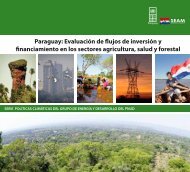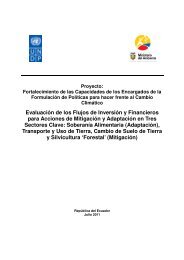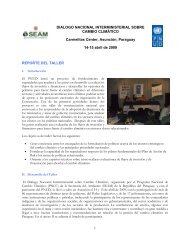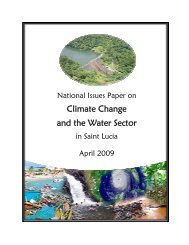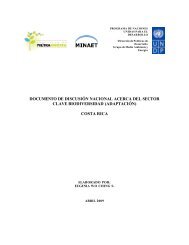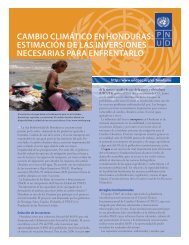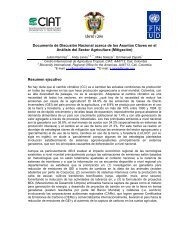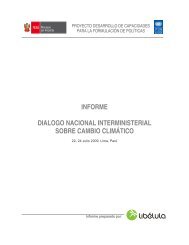View Publication - UNDPCC.org
View Publication - UNDPCC.org
View Publication - UNDPCC.org
You also want an ePaper? Increase the reach of your titles
YUMPU automatically turns print PDFs into web optimized ePapers that Google loves.
25 Cannady — Access to Climate Change Technology by Developing Countries: A Practical Strategy<br />
developed country parties. 72 The UNFCCC<br />
process can shift this focus to an approach<br />
that is both more empowering and more<br />
pragmatic, whereby developing countries<br />
claim their power to participate in climate<br />
change technology. The two prongs of such an<br />
approach, and their more detailed elements,<br />
are delineated in this paper: CCTIS and “win–<br />
win” technology contracts.<br />
Third, there should be less emphasis on<br />
“mechanisms” as a magic way to somehow<br />
leap over the fundamental problems that<br />
developing countries face, namely lack of<br />
funding for education and research, lack<br />
of bargaining power, and lack of capacity<br />
in practical skills such as technology<br />
management, contract negotiation and patent<br />
drafting. Pools, patent information databases<br />
and structured licensing mechanisms are all<br />
found in the recommendations, but for the<br />
reasons detailed in this paper they are likely<br />
to be of limited effectiveness to developing<br />
countries. The likely result will be gains for<br />
IT companies and IP professionals based in<br />
developed countries, and for companies with<br />
strong patent portfolios. 73 Similarly, the focus<br />
on technology mapping and patent landscaping<br />
should be re-examined to determine what<br />
the actual deliverables would be and in what<br />
way such deliverables would deliver concrete<br />
benefits to developing countries.<br />
Fourth, there should be more emphasis on how<br />
IP works in practice. The recommendations<br />
briefly reference “measures to address<br />
intellectual property rights”. This needs to<br />
be turned to a different angle: “Measures<br />
to address the need for building developing<br />
country intellectual property assets”. Current<br />
documents and discussions do not address the<br />
critical importance of developing country<br />
research being supported and valorised – that<br />
is, becoming the subject of patent applications<br />
by developing country parties. And yet this<br />
is fundamental if developing countries are to<br />
engage in the types of technology transfer<br />
deal that this document envisions.<br />
Finally, the current drafts and discussions need<br />
to be more specific on funding initiatives.<br />
If there is to be funding for climate change<br />
technology for developing countries, then who<br />
would be the recipients? Specific measures and<br />
facilities for funding climate change technology<br />
research, development and commercialization<br />
in developing countries by developing country<br />
parties need to be addressed and detailed.<br />
The Copenhagen debate should put more<br />
emphasis on international financial support<br />
for national technology innovation plans<br />
based on national needs and capacities (as<br />
defined by developing country parties), and<br />
less emphasis on creation of an international<br />
bureaucratic structure to collect and evaluate<br />
technology and technology projects. Scientists<br />
must do technology assessment, preferably<br />
in developing countries. Technology plans<br />
should be developed on a national and<br />
possibly regional basis; tasking international<br />
bureaucracies with analysing technology and<br />
making plans applicable to all countries is<br />
paternalistic, 74 underestimating both the<br />
complexity of technology and the capacity<br />
of people in developing countries to analyse<br />
their needs and capacities.




